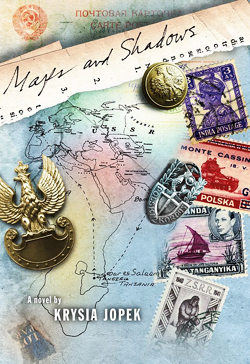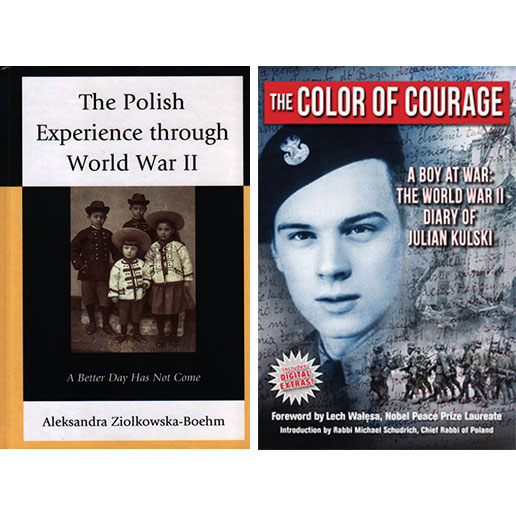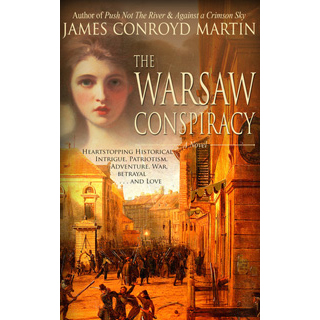 Maps and Shadows
Maps and Shadows
By Krysia Jopek
Aquila Polonica; Los Angeles, 2010
ISBN 978-1-60772-007-2
Every new book published by Aquila Polonica is an event. Here at CR we watch for the latest book, eagerly awaiting our copy. The first glance is always a visual treat. The cover design, by Aquila’s designer (and partner), Stefan Mucha, using knowledgeably selected images with muted yet effective colors, is immediately engaging. The maps and illustrations inside perfectly complement the story. These are publishers who care about their books and respect their writers.
A brief aside. When publisher Terry Tegnazian came to the Polish Embassy in Ottawa to promote their first book, The Mermaid and the Messerschmidt, the Ottawa Citizen’s book editor was so impressed he ran the review on two pages with four photographs in color, even adding color borders carefully matched to conform to the book’s aesthetic. Nothing could have prepared the embassy for the crowds; they filled the large ballroom, spilled over into the foyer and up the winding staircase, while latecomers had to be turned away. Ms Tegnazian’s presentation was superb; the book fulfilled its promise. Aquila Polonica made an indelible mark.
Maps and Shadows is Aquila’s first venture into fiction. The author, Krysia Jopek, who taught English literature and writing at City College of New York, is a poet. This, her debut novel for which she won the Independent Book Publishers Associations’ Ben Franklin Award, was inspired by her family’s history, and also by the necessity to give voice to a generation that was forcibly silenced.
The story is told by four narrators, Jopek’s mother, Helcia, her uncle, Henryk, and her grandparents, Zofia and Andrzej. It’s an apt literary device for this story because while the love in the family remained constant, the force of war separated them. Each had his own perspectives, her own worries.
Andrzej was stripped of the power to protect his family from the start, when forced to kneel at gunpoint when the family was arrested. Zofia could provide no comfort and no food for her children, not even the youngest, Józef. Little Józef, too young to have been given a voice, remains always in the narratives of his elders. Teenage Helcia and Henryk watched their parents’ health deteriorate and their aging accelerate, while they themselves were deprived of their education and anxiously wondered about the future.
The unforgiving war continued but took a new course, as Stalin’s ally, Hitler, turned his armies on Russia. Forced into a new alliance, Stalin had to liberate his Polish prisoners, though the idea of “liberation” was hardly understood in the Soviet Union. The malnourished survivors of the brutal deportations left their camps to seek out Polish authorities.
Andrzej, who had not been able to defend his family went off to join the Polish army, and at least defend his country. The family understood, but Andrzej would be plagued by guilt and anxiety over his decision.
Typhoid struck. Zofia’s delirium brought images of her farm, the fruit trees, the flowers and her children at play. They recovered, but were barely able to get up. Henryk, though thin as a stick, joined the army but walked miles to bring back food for his family only to find them gone. They had been evacuated by Polish authorities to Persia but it was years before they would find one another again.
But this was still only half the journey. The rest would take them across seas and oceans, the Middle East, Africa, Europe and finally America.
They were not long in America when, ironically, Henryk – not yet a citizen – was drafted into the US Army. Not so long before, he and his father were denied recognition as an allied fighting force in the Victory Parade in England, and now he was to fight for yet another country. He did his duty but it was a relief for Zofia when this new war ended before her son had to go to Korea.
The family started anew, encouraged one another, and worked hard to give to the new generation what was taken from them.
Maps and Shadows is a gentle book. More precisely, it is a story told by gentle people. You will not find anger, vengeance or hate here. That said, you will find no glorification of war, no sympathy for those people “busy rearranging borders [who do not] hear the gunshots, glimpse the people…”
CR




Pingback: Bulletin Board Summer 2015